Defense Secretary Delfin Lorenzana: The man responsible for protecting the Philippines
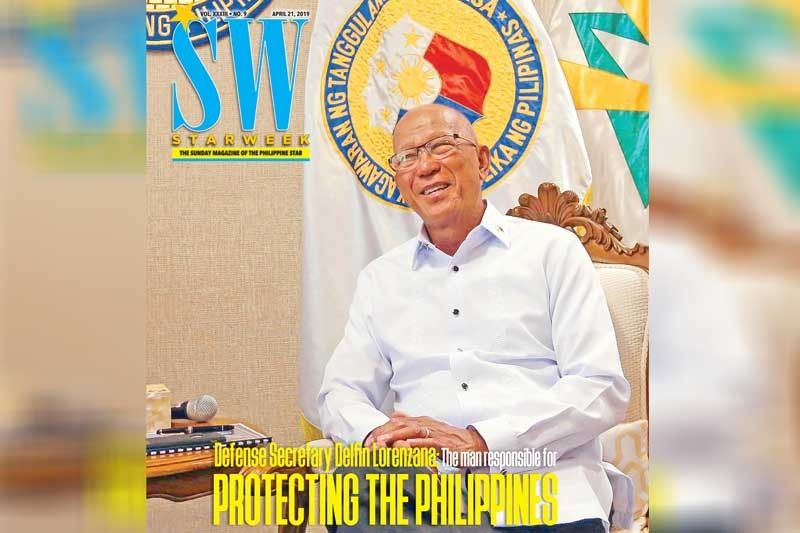
MANILA, Philippines — Serving in the cabinet never crossed the mind of Delfin Lorenzana before 2016.
Then the head of the Office of Veterans Affairs at the Philippine embassy in Washington, the former military man was looking forward to a quiet retirement at a farm in Cotabato when his longtime friend, Davao City mayor and president-elect Rodrigo Duterte, met with him 10 days after the elections and asked for his help.
He acquiesced, not knowing that the help Duterte was asking for entails a Cabinet portfolio responsible for the country’s national defense.
“I did not know. I was surprised when it was announced that I will be the defense secretary,” the 70-year-old Lorenzana tells STARweek in Filipino, recalling the first time the assignment was announced during a press conference a few days after their initial meeting.
The surprise, however, quickly turned into determination to serve in an entirely new capacity, with the secretary recalling his pledge to help the incoming administration.
“Initially it was difficult because I have been away for 14 years… Of course, it is a new job, it is very difficult,” he admits.
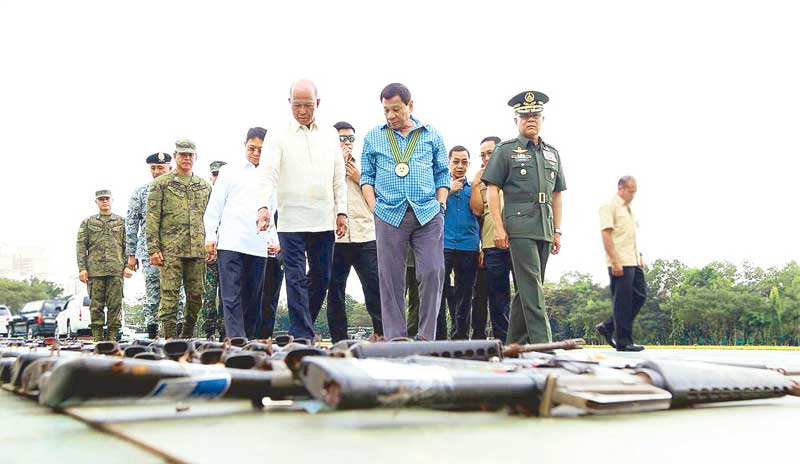
President Duterte and Defense Secretary Lorenzana inspect weapons captured, confiscated and recovered from terrorists during the Marawi crisis.
“But after about three months, I was already acclimatized. I already know the job,” he adds, citing the support and cooperation of the people at the Department of National Defense (DND).
Duterte and Lorenzana go way back, meeting in the late 80s when the former was just beginning his political career in Davao City and the latter was serving as commander of the battalion assigned in the city.
Lorenzana and his battalion was credited for their role in addressing insurgent and other criminal activities, which supposedly paved way for the peace and order and economic development of Davao City.
The defense chief says he has maintained contact with Duterte even as he rose from the ranks, serving in various positions until his last posting as defense attaché in Washington from 2002 to 2004.
Born in Midsayap, Cotabato in 1948, Lorenzana was raised in the town of Parang, where he finished his primary and secondary schooling. He spent two years at the Notre Dame University in Cotabato City before joining the Philippine Military Academy in 1969. He is married to Editha Lorenzana and a father to four children. He has one granddaughter. During his 19 years in uniform, Lorenzana headed various army infantry units and was assigned in different parts of the country. He also served in staff positions, including as commander of the Special Operations Command of the Philippine Army.He also served in the presidential security group during the administrations of former presidents Corazon Aquino, Joseph Estrada and Gloria Macapagal-Arroyo. Lorenzana has a Master of Business Administration, major in Operations Research, degree from the Ateneo Graduate School of Business and finished a number of courses and trainings in international institutions. After retirement from active military service, he stayed in the United States and headed the Office of Veterans Affairs at the Philippine embassy in Washington, rallying for the cause of Filipino veterans, including securing benefits for those who served in the US Army during the Second World War.
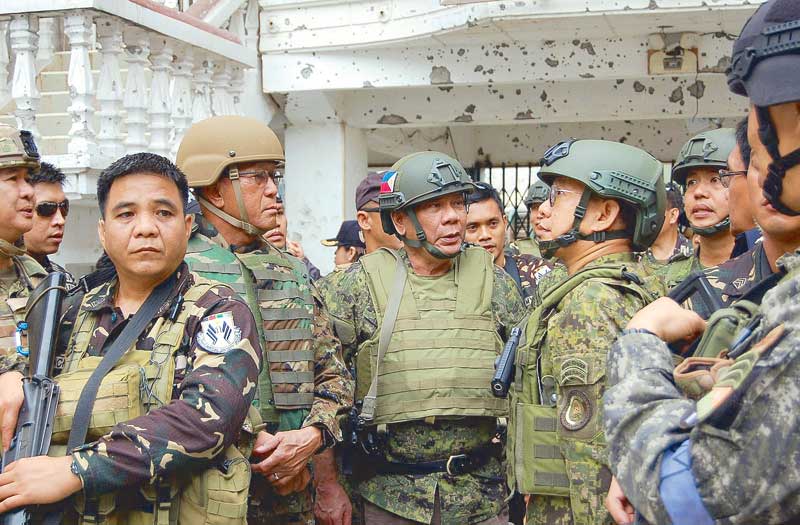
President Duterte visits Marawi City with Lorenzana and other top military officers.
He describes the experience as different from his role in the military. Instead of dealing with insurgents in far-flung areas, Lorenzana was thrust into the halls of power in Washington DC, meeting with lawmakers and lobbying for laws that would benefit ageing Filipino veterans. The secretary says he found the experience he gained in the US as useful in his role as defense chief. “I gained confidence in talking to them,” he says, referring to policymakers. “When you meet these people, you will not be afraid, you will no longer have inferiority complex when you talk to them and you can expound on your ideas.”
Since assuming office, the defense chief has largely maintained a low profile, a difficult feat considering the major issues that his office has to deal with, both internally and externally.
For example, in 2017, Lorenzana was named administrator of the martial law that was declared in Mindanao in the aftermath of the siege of Marawi City.
The declaration of martial law – which remains in effect until today – proved to be controversial for the Duterte administration, having to defend it before the Supreme Court several times. While Malacañang touts that martial law has been instrumental in securing peace in Mindanao in the last two years, Lorenzana admits that terrorism remains one of the biggest security threats that the country is facing.“I think that should stop once and for all because as long as they are there, Mindanao cannot develop. It will not progress, especially the Muslim areas,” he says.
Addressing this, however, is not as simple as sending armed forces on the ground. He stresses the importance of the “whole of government” approach, wherein all agencies would work together to address root causes of the problem that drive people into committing the crimes.
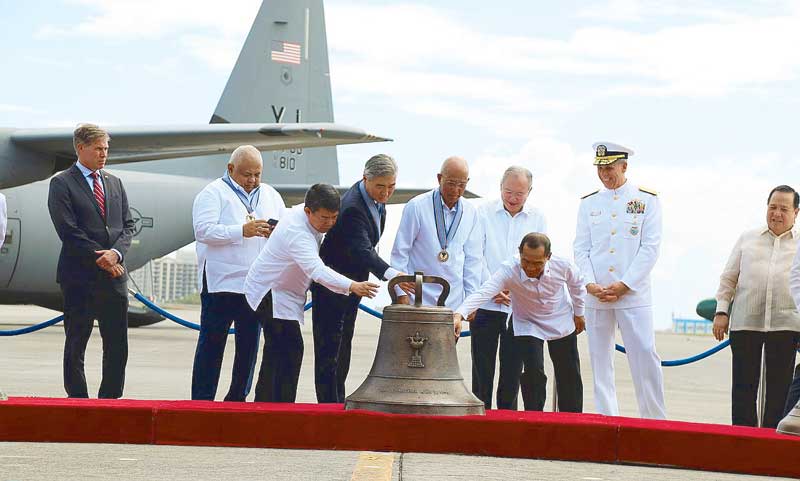
Lorenzana and US Ambassador to the Philippines Sung Kim at the turnover ceremony of the Balangiga bells.
Lorenzana says they are also using the same approach to address the communist insurgency, noting that rebels surrender once they see that the government is working to provide for their needs.
“An important component of this are the local officials, the local governments,” he says, stressing that the task of addressing the problems should not be left to the military.
He also cites cybersecurity as an emerging threat in terms of national security.
“We take the cyber threats very seriously,” he says. “I have here some people working with the DICT (Department of Information and Communications Technology), with NSA (National Security Agency) and NICA (National Intelligence Coordinating Agency) and we are actually trying to replicate some of the best practices of neighboring countries like Singapore.”
One of the biggest challenges of his job, according to Lorenzana, is trying to balance the desires of the President with the situation on the ground.
He cites as an example Duterte’s previous pronouncement that he wants the US military to leave the country.
“I have to clarify with him what he really wants. (I asked) if it will be immediate or if they can stay for some more years. He said, ‘not (immediate), they can stay for a couple of years more while we are fighting the terrorists.’ That’s what happened so that’s what I reported to the media,” the defense chief recalls.
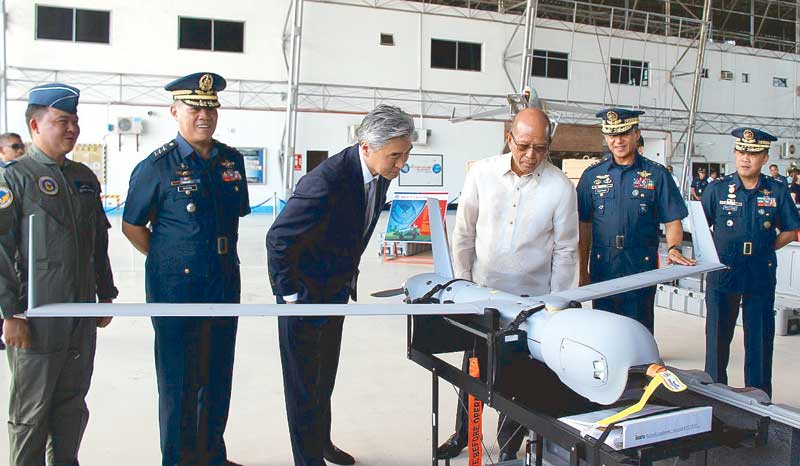
Inspecting one of the six unmanned aerial vehicles of the ScanEagle 2 System.
“And then he said, ‘no more (Balikatan) exercises,’ so I returned to him and asked him what he really wants… He said to limit it, so that’s what we did – we limited it, but it continues,” he adds.
Incidentally, Lorenzana, during his time in the military, was among those who drafted the terms of reference for the annual exercises, putting him in the best position to tell the Chief Executive of its benefits for the country. And while internally his relationship with the President appears to be great as ever, in public some have expressed concern over his statements that have at times been interpreted as contradicting Duterte. Among these are his warning about the creation of a death squad as previously announced by the President, as well as his revelations about Chinese activities in the West Philippine Sea even as the government pushes for friendly ties with Beijing. Articles have described him as “audacious” and a “curious case,” primarily due to his rather controversial remarks that have earned him both praise and criticism. Asked about it, Lorenzana says observations that he contradicts the President is not true. “I always go to him and ask him what he really wants. He tells me that this is what he wants and then I go to the media and say that. I never went to the media first. Never. So he knows what I am going to say,” he says.
“Sometimes it’s difficult to navigate, but the President is OK. He listens to advice that will be for the benefit of our country,” adds the secretary.
On his call for the review of the mutual defense treaty with the US, which was contradicted by Foreign Affairs Secretary Teodoro Locsin Jr., Lorenzana says they have agreed to maintain their stance as they are seeing the issue from different perspectives.
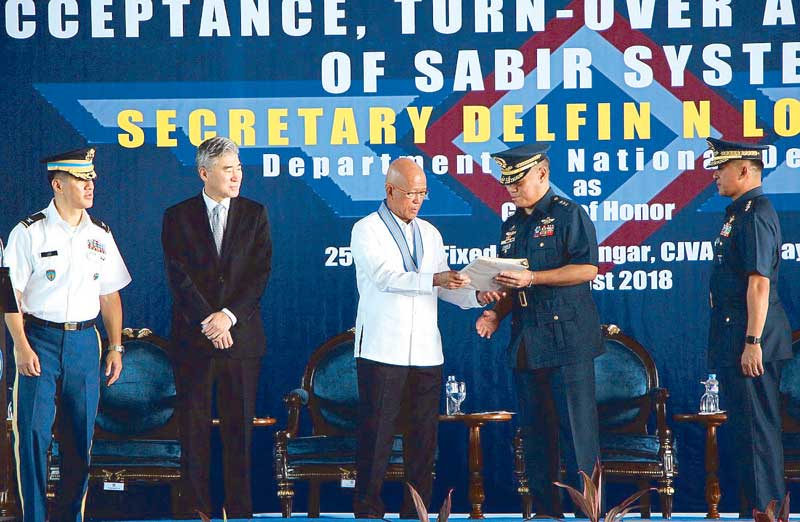
Lorenzana hands over Special Airborne Mission Installation and Response System documents to Philippine Air Force officials while Ambassador Kim looks on.
“It’s not good if we just have this herd mentality where everyone would just follow. It is better if there is some questioning so we can really think through properly what we are going to do,” he adds.
A sore point in the implementation of the national defense strategy is the territorial dispute in the West Philippine Sea/South China Sea. Lorenzana says he recognizes the challenge of balancing ensuring the country’s sovereignty with the Duterte administration’s thrust to have friendlier ties with Beijing after the tumultuous experience of the previous administration.Contrary to claims of critics, the defense chief maintains that the administration follows through with its vow not give up an inch of the country’s territory. He recognizes public sentiments against Chinese activities in the disputed territories, but calls on Filipinos to recognize the realities on the ground.
“We don’t have the force to stop them so it is unfair for the people to blame us for this,” he says, referring to the Chinese reclamation in its occupied features.
He said the Chinese were already occupying the said features when Duterte took over, saying “not even an inch was grabbed by the Chinese when he was the President.”
“They did not get anything and we will try to maintain that,” he adds.
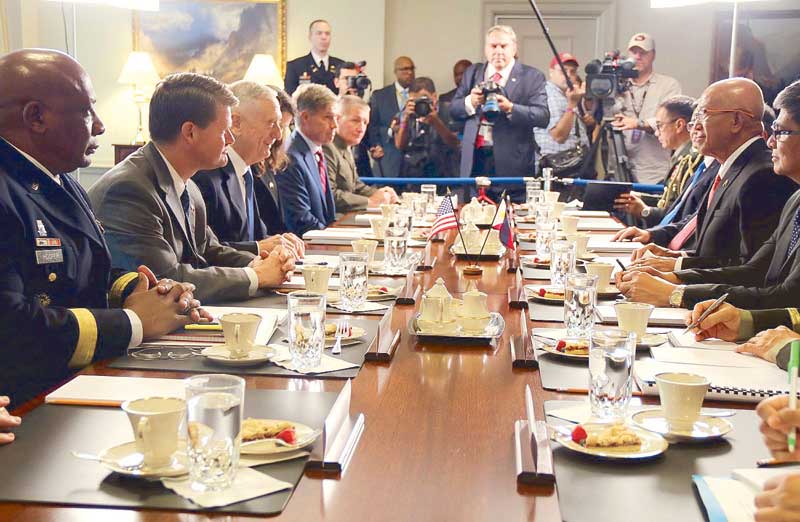
Lorenzana and US Defense Secretary Jim Mattis, accompanied by defense officials of both countries, hold a bilateral meeting in Washington DC.
Over time, the hope is to further strengthen the country’s military and defense system.According to Lorenzana, the Philippines is on track in terms of its military development, saying the government is now looking at procuring additional vessels and ships, including fast craft to improve security at the country’s southern borders.
He says they are pushing for additional funds to be able to purchase more equipment, including American and Russian helicopters.
“Beyond the term of the President, we are all looking at submarines, heavy-lifting helicopters – the big ones – and more ships,” he says. “And radars also because we have to be aware of what is happening around us. We lack radars for what they call domain awareness.”
Three years into his term, Lorenzana says he has no regrets with his decision to temporarily forgo his retirement, reiterating his promise to Duterte that he will help him in running the country.
“Rest assured we are doing everything to secure the Philippines – secure from terrorists, secure from insurgency,” he says.
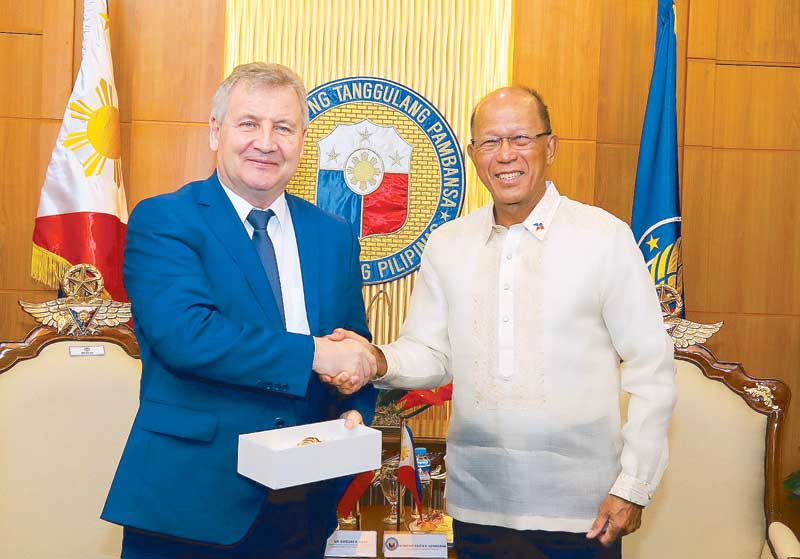
Lorenzana welcomes director general for intellectual property of the Russian Federation Grigory Ivliev.
- Latest
- Trending














